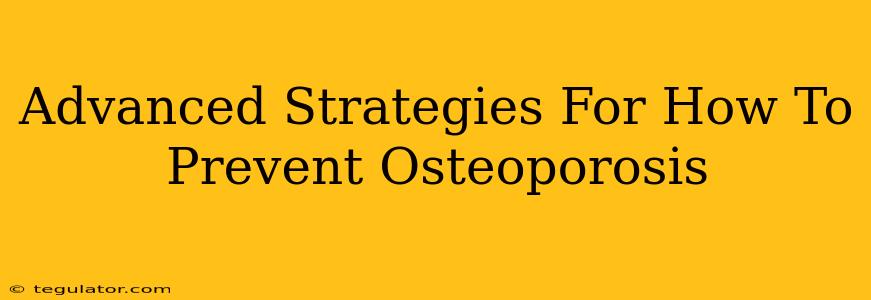Osteoporosis, a condition characterized by weakened bones, is a silent thief, often progressing unnoticed until a fracture occurs. While genetics play a role, proactive lifestyle choices significantly impact your bone health and can significantly reduce your risk of developing osteoporosis. This guide delves into advanced strategies beyond the basics, empowering you to take control of your bone density and enjoy a healthier, more active life.
Beyond Calcium and Vitamin D: Nurturing Bone Health
While calcium and vitamin D are undeniably crucial for bone health, a holistic approach goes much further. Think of it like building a house: you need a strong foundation (calcium and vitamin D), but also sturdy walls (other nutrients), a robust framework (exercise), and protection from the elements (lifestyle choices).
1. Prioritize Protein Intake:
Protein is essential for building and repairing bone tissue. Insufficient protein intake can hinder bone formation and increase the risk of fractures. Aim for a diet rich in lean protein sources like:
- Fish: Salmon, tuna, and sardines are excellent choices, also providing vitamin D.
- Poultry: Chicken and turkey are lean protein sources.
- Legumes: Lentils, beans, and chickpeas offer protein and other bone-supporting nutrients.
- Dairy: Greek yogurt and cheese are great sources of protein and calcium.
Pro Tip: Ensure you're consuming sufficient protein throughout the day, distributing it across multiple meals rather than just one large meal.
2. Embrace a Rainbow of Fruits and Vegetables:
A vibrant diet brimming with fruits and vegetables offers a wealth of micronutrients vital for bone health. Focus on:
- Leafy Greens: Spinach, kale, and collard greens are rich in vitamin K, crucial for bone metabolism.
- Cruciferous Vegetables: Broccoli, cauliflower, and Brussels sprouts provide various bone-boosting nutrients.
- Citrus Fruits: Oranges and grapefruits are excellent sources of vitamin C, aiding collagen production, a key component of bone structure.
3. The Power of Magnesium and Potassium:
Often overlooked, magnesium and potassium play critical roles in bone health. Magnesium helps regulate calcium absorption and bone formation, while potassium may help protect against bone loss. Good sources include:
- Magnesium: Almonds, spinach, black beans
- Potassium: Bananas, sweet potatoes, avocados
Exercise: More Than Just Weight-Bearing
While weight-bearing exercises are essential, a comprehensive approach to physical activity is key.
1. Weight-Bearing Exercises:
These exercises force you to work against gravity, stimulating bone growth and density. Examples include:
- Walking: A simple, accessible, and highly effective exercise.
- Hiking: Offers varied terrain and added challenge.
- Weight Training: Strength training builds muscle mass, which supports bones.
- Dancing: A fun way to incorporate weight-bearing activity.
2. Resistance Training:
This type of training builds muscle strength and improves bone density. It's especially important as we age to prevent muscle loss and maintain bone health.
3. Balance and Flexibility Exercises:
These exercises are crucial for preventing falls, a major risk factor for osteoporosis-related fractures. Yoga and Tai Chi are excellent choices.
Lifestyle Factors and Bone Health:
Beyond diet and exercise, lifestyle significantly impacts bone health.
1. Sun Exposure:
Moderate sun exposure helps your body produce vitamin D, crucial for calcium absorption. However, remember to protect yourself from sunburn.
2. Limit Alcohol and Caffeine:
Excessive alcohol consumption and high caffeine intake can interfere with calcium absorption and increase bone loss.
3. Smoking Cessation:
Smoking significantly increases the risk of osteoporosis and fractures. Quitting smoking is one of the best things you can do for your overall health, including bone health.
4. Regular Bone Density Screening:
Regular check-ups with your doctor, including bone density scans (DEXA scans), can help detect early signs of osteoporosis and allow for timely intervention.
Conclusion: A Proactive Approach to Bone Health
Preventing osteoporosis is a journey, not a destination. By adopting these advanced strategies and making them a consistent part of your life, you significantly reduce your risk and invest in a healthier, more active future. Remember, consulting your doctor or a registered dietitian is always recommended for personalized advice tailored to your individual needs and health status.

